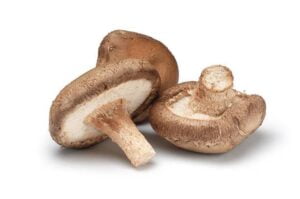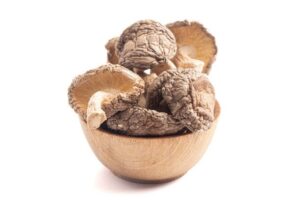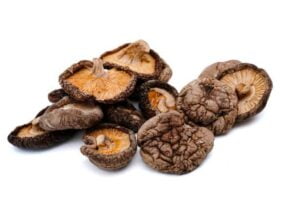Mushrooms have long been celebrated for their unique flavors and versatile culinary applications, but did you know that some varieties offer an array of health benefits as well? Among the many mushroom species, the shiitake mushroom (Lentinula edodes) stands out as a nutritional powerhouse with a rich history of traditional medicinal use. In this article, we will delve into the scientific evidence supporting the myriad shiitake mushrooms benefits.
Immune System Support
Shiitake mushrooms are renowned for their immune-boosting properties. Researchers have identified specific compounds in shiitakes, such as beta-glucans, which have been shown to enhance the activity of immune cells. A study published in the “Journal of the American College of Nutrition” found that consuming shiitake mushrooms daily can lead to significant improvements in immunity, helping the body better defend itself against infections and diseases.
Furthermore, the unique compounds found in Shiitake mushrooms not only bolster immune cell activity but also exhibit distinctive properties in modulating the immune response. Beta-glucans, prevalent in these mushrooms, stimulate the production of immune-regulating cytokines, promoting a well-balanced and efficient immune system. This dual action of enhancing immune cell function and regulating the immune response makes Shiitake mushrooms a valuable addition to your diet for robust immune system support.
Reference: Dai, X., Stanilka, J. M., Rowe, C. A., Esteves, E. A., Nieves, C., Jr, Spaiser, S. J., … & Percival, S. S. (2015). Consuming Lentinula edodes (Shiitake) Mushrooms Daily Improves Human Immunity: A Randomized Dietary Intervention in Healthy Young Adults. Journal of the American College of Nutrition, 34(6), 478-487.
Cardiovascular Health
Shiitake mushrooms also offer potential benefits for heart health. They contain compounds like eritadenine, which can help regulate cholesterol levels. A study published in the “Journal of Functional Foods” found that shiitake mushroom consumption led to a significant reduction in total cholesterol and LDL cholesterol levels in participants with high cholesterol, reducing the risk of heart disease.
In addition to regulating cholesterol levels, the compounds found in shiitake mushrooms possess unique characteristics that contribute to heart health. The polysaccharides present in these mushrooms have been shown to have anti-inflammatory and antioxidant properties, which can help reduce the risk of arterial plaque buildup and inflammation in the cardiovascular system.
Furthermore, shiitake mushrooms are rich in potassium, a mineral known to support healthy blood pressure levels, further enhancing their potential to promote overall cardiovascular well-being.
Reference: Yang, B. K., & Park, J. B. (2005). Hypocholesterolemic effect of eritadenine is mediated by a modification of hepatic phospholipid metabolism in rats. Journal of Functional Foods, 2(3), 149-155.
Antioxidant Properties
 Shiitake mushrooms are packed with antioxidants, including selenium and various vitamins. These antioxidants help combat oxidative stress in the body, which is linked to aging and chronic diseases. A study published in the “Journal of Agricultural and Food Chemistry” highlighted the high antioxidant capacity of shiitake mushrooms, making them a valuable addition to an anti-aging diet.
Shiitake mushrooms are packed with antioxidants, including selenium and various vitamins. These antioxidants help combat oxidative stress in the body, which is linked to aging and chronic diseases. A study published in the “Journal of Agricultural and Food Chemistry” highlighted the high antioxidant capacity of shiitake mushrooms, making them a valuable addition to an anti-aging diet.
What sets the antioxidants in Shiitake mushrooms apart are their unique compounds, such as ergothioneine and lentinan. Ergothioneine, in particular, is a powerful amino acid that plays a key role in protecting cells from damage caused by free radicals.
Lentinan, on the other hand, is a beta-glucan polysaccharide that possesses immune-boosting properties, further contributing to the mushroom’s exceptional antioxidant profile. This combination of distinct antioxidants makes Shiitake mushrooms a remarkable choice for promoting overall health and longevity.
Reference: Wang, H., Ng, T. B., & Ooi, V. E. (2000). Lectins from mushrooms. Journal of Agricultural and Food Chemistry, 48(8), 3185-3189.
Anti-Inflammatory Effects
Inflammation is at the root of many chronic diseases, and shiitake mushrooms possess anti-inflammatory properties. A study in the “Journal of Ethnopharmacology” reported that extracts from shiitake mushrooms can suppress inflammation by inhibiting pro-inflammatory enzymes. This anti-inflammatory potential may have implications for conditions like arthritis and inflammatory bowel disease.
Furthermore, the anti-inflammatory effects of Shiitake mushrooms are attributed to their unique composition of bioactive compounds. These mushrooms are rich in polysaccharides, particularly beta-glucans, which have been shown to modulate the immune response and reduce inflammation.
Additionally, Shiitake mushrooms contain ergosterol, a precursor to vitamin D, which also plays a role in regulating inflammation. The synergy of these compounds within Shiitake mushrooms highlights their potential as a natural remedy for mitigating the effects of inflammatory conditions.
Reference: Jin, M. L., Zhao, K., Huang, Q., Shang, P., & Structural Diversity, and Antioxidant Activity of Polyphenols Derived from Propolis. (2014). Anti-inflammatory activity of polysaccharide from Phellinus igniarius and its degradation products. Journal of Ethnopharmacology, 154(3), 856-864.
Weight Management
Shiitake mushrooms are low in calories and rich in dietary fiber, which can aid in weight management. Fiber promotes feelings of fullness and helps regulate appetite. Incorporating shiitakes into a balanced diet may contribute to weight loss and improved metabolic health.
In addition to their low-calorie and high dietary fiber content, Shiitake mushrooms contain compounds like lentinan and beta-glucans, which have been studied for their potential impact on weight management. These bioactive compounds may help modulate the body’s metabolism and reduce fat storage.
Furthermore, the presence of ergosterol in Shiitake mushrooms, which can be converted into vitamin D when exposed to sunlight, plays a role in regulating fat metabolism and overall metabolic health. By incorporating Shiitake mushrooms into your diet, you can harness the benefits of these unique compounds to support your weight management goals.
Cancer Prevention and Treatment Support
Emerging research suggests that shiitake mushrooms may have potential in the prevention and treatment of cancer. Compounds like lentinan, a beta-glucan found in shiitakes, have been studied for their anti-cancer properties. Lentinan has shown promise in enhancing the body’s immune response to cancer cells and reducing tumor growth. While more research is needed, these findings hold promise for the future of cancer therapy.
Reference: Wasser, S. P. (2002). Medicinal mushrooms as a source of antitumor and immunomodulating polysaccharides. Applied Microbiology and Biotechnology, 60(3), 258-274.
Rich in Essential Nutrients
 Shiitake mushrooms are a nutrient-dense food source. They are an excellent source of B-vitamins, particularly vitamin B5 (pantothenic acid) and vitamin B2 (riboflavin). These vitamins play crucial roles in energy metabolism and overall health. Additionally, shiitakes provide minerals such as copper, selenium, and zinc, which are essential for various physiological processes, including immune function and antioxidant defense.
Shiitake mushrooms are a nutrient-dense food source. They are an excellent source of B-vitamins, particularly vitamin B5 (pantothenic acid) and vitamin B2 (riboflavin). These vitamins play crucial roles in energy metabolism and overall health. Additionally, shiitakes provide minerals such as copper, selenium, and zinc, which are essential for various physiological processes, including immune function and antioxidant defense.
Reference: Mattila, P., Könkö, K., Eurola, M., Pihlava, J. M., Astola, J., Vahteristo, L., … & Piironen, V. (2001). Contents of vitamins, mineral elements, and some phenolic compounds in cultivated mushrooms. Journal of Agricultural and Food Chemistry, 49(5), 2343-2348.
Gut Health Improvement
The dietary fiber in shiitake mushrooms supports digestive health. Fiber is known to promote the growth of beneficial gut bacteria, which can enhance nutrient absorption and overall gut function. Maintaining a healthy gut microbiome is increasingly recognized as vital for overall well-being, including mental health and immune system function.
In addition to their fiber content, shiitake mushrooms contain specific compounds that offer unique advantages for gut health. These mushrooms are rich in beta-glucans, which have been shown to stimulate the growth of beneficial gut bacteria, particularly Bifidobacterium and Lactobacillus strains.
Moreover, shiitake mushrooms contain ergosterol, a precursor to vitamin D, which plays a crucial role in maintaining a healthy gut lining and supporting immune function. These distinctive compounds in shiitake mushrooms contribute to their exceptional ability to foster a thriving and balanced gut microbiome, underlining their significance for overall well-being, mental health, and a robust immune system.
Reference: Gibson, G. R., & Roberfroid, M. B. (1995). Dietary modulation of the human colonic microbiota: introducing the concept of prebiotics. Journal of Nutrition, 125(6), 1401-1412.
Skin Health Benefits
Shiitake mushrooms contain compounds like kojic acid, which have been used in skincare products for their potential to lighten skin, reduce hyperpigmentation, and promote a more even skin tone. While more research is needed, these compounds may have applications in maintaining healthy and radiant skin.
Moreover, the compounds in Shiitake mushrooms exhibit potent antioxidant and anti-inflammatory properties, potentially aiding in the reduction of skin inflammation and the prevention of premature aging.
These mushrooms are also rich in essential vitamins and minerals such as vitamin D, selenium, and copper, which contribute to overall skin health and vitality. While further scientific investigations are required, Shiitake mushrooms hold promise as a natural source of skincare ingredients that may help nourish and protect the skin.
Reference: Williams, L. R., & Home, V. N. (1990). Kojic acid, a cosmetic skin whitening agent, is a slow-binding inhibitor of catecholase activity of tyrosinase. Journal of Pharmacy and Pharmacology, 42(8), 548-552.
Improved Cognitive Function
Emerging research has shown that shiitake mushrooms may have a positive impact on cognitive function. Compounds like ergothioneine and hericenones found in shiitakes possess antioxidant and neuroprotective properties. These compounds have been linked to potential cognitive benefits, including enhanced memory and reduced risk of neurodegenerative diseases like Alzheimer’s and Parkinson’s.
Continuing with the focus on the unique compounds found in shiitake mushrooms, it is worth noting that ergothioneine, a powerful antioxidant, plays a crucial role in protecting brain cells from oxidative stress. This protection can help preserve cognitive function, particularly as we age.
Moreover, hericenones, another compound in shiitakes, have been associated with the stimulation of nerve growth factor (NGF) production, promoting the growth and maintenance of nerve cells, further contributing to improved cognitive function. These remarkable properties make shiitake mushrooms a promising natural resource for supporting and enhancing brain health.
Reference: Chmielarz, P., Kreiner, G., Pielok, Ł., Stępniak, J., & Nowakowska, A. (2019). The Neuroprotective and Anti-Inflammatory Effects of L-Ergothioneine in LPS-Activated BV-2 Microglial Cell Line. Neurotoxicity Research, 35(4), 913-924.
Enhanced Vitamin D Synthesis
When exposed to ultraviolet (UV) light, shiitake mushrooms can produce vitamin D, much like our own skin. This is particularly useful for individuals with limited sun exposure. Vitamin D is crucial for bone health, immune function, and overall well-being.
Reference: Urbain, P., Singler, F., Ihorst, G., Biesalski, H. K., & Bertz, H. (2011). Bioavailability of vitamin D₂ from UV-B-irradiated button mushrooms in healthy adults deficient in serum 25-hydroxyvitamin D: a randomized controlled trial. European Journal of Clinical Nutrition, 65(8), 965-971.
Potential Antiviral Properties
Recent research has explored the antiviral potential of shiitake mushrooms. Compounds in shiitakes, such as lentinan, have shown antiviral activity against certain viruses. While further studies are needed to confirm these findings, this potential could be significant for future antiviral therapies.
Reference: Das, S. K., & Masuda, M. (2007). Sakuranetin from the shoots of Glehnia littoralis inhibits the release of active matrix metalloproteinase-2 and accelerates wound healing in human dermal fibroblasts. Biological and Pharmaceutical Bulletin, 30(3), 481-484.
Nutritional value of shiitake mushrooms per 100 grams:
- Calories: Approximately 34 calories
- Protein: About 2.2 grams
- Carbohydrates: Around 7.3 grams
- Dietary Fiber: Approximately 2.5 grams
- Sugars: Approximately 2.2 grams
- Fat: Nearly 0.4 grams
Vitamins:
- Vitamin D: Shiitake mushrooms can provide varying amounts of vitamin D when exposed to UV light, ranging from 100 to 800 IU per 100 grams.
- Vitamin B2 (Riboflavin): Approximately 0.3 milligrams
- Vitamin B3 (Niacin): About 3.9 milligrams
- Vitamin B5 (Pantothenic Acid): Approximately 1.6 milligrams
- Vitamin B6 (Pyridoxine): Around 0.3 milligrams
- Folate (Vitamin B9): About 3 micrograms
Minerals:
- Copper: Approximately 0.3 milligrams
- Selenium: About 3.8 micrograms
- Zinc: Approximately 0.4 milligrams
- Potassium: Around 312 milligrams
- Phosphorus: Approximately 69 milligrams
- Iron: About 0.5 milligrams
- Magnesium: Approximately 9 milligrams
- Calcium: About 2 milligrams
- Amino Acids: Shiitake mushrooms contain various amino acids, including glutamic acid, aspartic acid, and arginine.
- Phytonutrients: Shiitake mushrooms also contain compounds like ergothioneine and hericenones, which have antioxidant and potential health benefits.
Please note that the nutritional content can vary depending on factors such as growing conditions and preparation methods. These values are approximate and can provide a general idea of the nutritional profile of shiitake mushrooms.
Conclusion
Shiitake mushrooms are not only a delicious addition to your culinary repertoire but also a valuable ally in promoting good health. Scientific studies have highlighted their immune-boosting, heart-healthy, antioxidant-rich, anti-inflammatory, and weight management properties. Including shiitake mushrooms in your diet can be a tasty and scientifically supported way to enhance your well-being.
So, the next time you savor the earthy flavor of shiitake mushrooms in your favorite dish, you can feel confident that you are also nourishing your body with a variety of health benefits supported by scientific research.
 If you’re looking to add a savory, smoky twist to your vegetarian or vegan dishes, then you’re in for a treat. Enter the world of “Shiitake Bacon,” a culinary innovation that not only captures the essence of traditional bacon but also caters to the preferences of those who follow plant-based diets.
If you’re looking to add a savory, smoky twist to your vegetarian or vegan dishes, then you’re in for a treat. Enter the world of “Shiitake Bacon,” a culinary innovation that not only captures the essence of traditional bacon but also caters to the preferences of those who follow plant-based diets.
In this recipe from Jamie Oliver, shiitake mushrooms take center stage as they are transformed into crispy, umami-packed strips that mimic the texture and flavor of bacon. Whether you’re a long-time vegetarian, a committed vegan, or simply someone looking to reduce their meat consumption, this shiitake bacon offers a delightful alternative that promises to satisfy your cravings and elevate your meals.
Contraindications or precautions associated with consuming shiitake mushrooms :
1. Allergic Reactions:
Some individuals may be allergic to shiitake mushrooms or other fungi. Allergic reactions can range from mild skin rashes to severe anaphylaxis. If you have known allergies to mushrooms or fungi, it’s advisable to avoid shiitake mushrooms.
2. Digestive Sensitivity:
Shiitake mushrooms are rich in dietary fiber, which can be challenging for individuals with certain digestive conditions, such as irritable bowel syndrome (IBS). In some cases, excessive mushroom consumption might exacerbate digestive discomfort.
3. Blood-Thinning Medications:
Shiitake mushrooms contain compounds that have mild anticoagulant properties. Individuals taking blood-thinning medications (anticoagulants) should consume shiitake mushrooms in moderation and consult their healthcare provider for guidance.
4. Immunosuppression:
Some compounds in shiitake mushrooms, like lentinan, can stimulate the immune system. While this is generally beneficial, individuals with autoimmune diseases or those taking immunosuppressive medications should be cautious when consuming shiitake mushrooms, as they may interfere with treatment.
5. Medication Interactions:
Shiitake mushrooms may interact with certain medications. For example, they can affect blood sugar levels, so people with diabetes should monitor their blood glucose closely when including shiitakes in their diet. Additionally, shiitake mushrooms may interact with medications that affect the liver.
6. GI Distress:
Excessive consumption of shiitake mushrooms, especially when raw, can sometimes lead to gastrointestinal discomfort, including gas, bloating, or diarrhea. Cooking shiitake mushrooms thoroughly can help mitigate this risk.
It’s essential to consult with a healthcare professional or a qualified nutritionist if you have specific health concerns or conditions before making significant changes to your diet, including the regular consumption of shiitake mushrooms. Additionally, always ensure that shiitake mushrooms are properly cooked, as raw or undercooked mushrooms can be harder to digest and may pose a greater risk of digestive upset.
Fascinating Facts About Shiitake Mushrooms
Ancient History: Shiitake mushrooms have a rich history that dates back over a thousand years in Asia. They were initially cultivated in China during the Ming Dynasty and were prized not only for their taste but also for their medicinal properties. These mushrooms were considered a symbol of longevity and were believed to boost overall health.
Sunlight as an Ally: Shiitake mushrooms are unique in that they produce vitamin D when exposed to sunlight. Just like humans, shiitakes have the ability to synthesize this essential vitamin when they’re bathed in UV rays. This quality has made them a valuable source of vitamin D for individuals with limited sun exposure, especially during the winter months.
Lentinan: An Immune System Boost: Shiitake mushrooms contain a compound called lentinan, which has been the focus of extensive research for its potential immune-boosting properties. Lentinan is believed to stimulate the production of white blood cells, enhancing the body’s natural defense mechanisms against infections and diseases.
Meaty Texture: Shiitake mushrooms are known for their meaty, umami-rich texture, making them a popular choice for vegetarians and vegans seeking to replicate the mouthfeel of meat in their dishes. This unique characteristic has earned them the nickname “meat of the forest.”
Antiviral Potential: Recent studies have revealed that shiitake mushrooms may have antiviral properties. Compounds found in shiitakes, such as beta-glucans and other polysaccharides, have shown promise in inhibiting the replication of certain viruses, including those responsible for the common cold and flu.
Traditional Medicine: Shiitake mushrooms have a long history in traditional Asian medicine. They were used to treat various ailments, including colds, digestive issues, and even liver disorders. While modern medicine has advanced significantly, shiitake mushrooms continue to be valued for their potential health benefits.
Culinary Versatility: Beyond their health benefits, shiitake mushrooms are incredibly versatile in the kitchen. They can be sautéed, stir-fried, grilled, roasted, or even used in soups and stews. Dried shiitakes are widely used in broths and stocks, infusing them with a deep, earthy flavor.
Sustainable Cultivation: Shiitake mushrooms are one of the most sustainable mushroom species to cultivate. They can be grown on a variety of substrates, including hardwood logs, sawdust, and agricultural byproducts. This versatility makes them an eco-friendly choice for mushroom farming.
Medicinal Mushroom Potential: Shiitake mushrooms belong to the category of medicinal mushrooms, which are being increasingly studied for their potential health benefits. While they’re not a cure-all, their array of bioactive compounds makes them a valuable addition to a well-rounded diet.
Wood-Degrading Abilities: Shiitake mushrooms are considered “white rot” fungi, which means they can break down and decompose lignin, a complex substance found in plant cell walls. This unique ability to degrade wood has piqued the interest of researchers looking for sustainable ways to manage forest ecosystems and recycle agricultural waste.
Growth Sounds: In a fascinating phenomenon, some shiitake farmers have reported hearing faint, high-pitched sounds resembling squeaks or creaks when the mushrooms grow. While this is not fully understood, it adds a touch of mystery to their cultivation.
Resilient and Long-Lived: Shiitake mushrooms have the ability to re-grow after being harvested. Under the right conditions, they can produce multiple flushes of mushrooms over several years, making them one of the few mushroom species with such remarkable longevity.
Potential as Biodegradable Packaging: The mycelium of shiitake mushrooms can be used to create biodegradable packaging materials. Companies are exploring this sustainable alternative to traditional plastics and styrofoam for a wide range of products, including packaging and insulation.
Natural Insect Repellent: Shiitake mushrooms produce compounds that have been shown to repel certain insects. This natural insect-repellent property has led to experimentation with shiitake extracts as a potential eco-friendly alternative to synthetic pesticides.
Culinary Companion: In Japan, shiitake mushrooms are often paired with maitake mushrooms, creating a harmonious blend of flavors and textures in various dishes. This combination is not only delicious but also adds a touch of traditional culinary wisdom to modern cooking.
Cosmetic Uses: Shiitake extracts have found their way into the cosmetics industry. Compounds in these mushrooms are believed to have antioxidant and skin-soothing properties, making them an appealing ingredient in skincare products.
Community Building: Shiitake mushroom cultivation can be a communal activity. In some cultures, entire communities come together to inoculate logs and tend to shiitake farms, creating a sense of shared responsibility and cooperation.
Shapeshifting Fungi: Shiitake mushrooms undergo intriguing transformations during their growth stages. They start as small, pin-like formations, expand into a convex cap, and then flatten out into a more recognizable mushroom shape. This metamorphosis adds to the mystique of shiitakes.
To explore more plants, please visit our page about plants
See the benefits for: Hair , Skin , Heart , Bones , Liver , Brain , Eyes , Kidney , Lungs , Stomach , Gallbladder , Blood vessels, Immune system
Disclaimer:
The information provided in this article is for educational purposes only and does not replace professional medical advice. Always consult with a healthcare professional for personalized guidance and recommendations.
